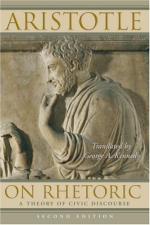
|
| Name: _________________________ | Period: ___________________ |
This test consists of 15 multiple choice questions and 5 short answer questions.
Multiple Choice Questions
1. How many common mistakes did Aristotle indicate were made in prose?
(a) Too many to list.
(b) Four.
(c) Two.
(d) Three.
2. As explained by Aristotle in Book III, Chapter 2, which type of words should a speech writer use?
(a) Words that are not easily pronounced.
(b) Words whose meanings are obvious.
(c) Words whose meanings are not obvious.
(d) Words that are easily pronounced.
3. In order to object to an argument using Aristotle's explanations, how might it be attacked?
(a) Scientifically.
(b) Directly.
(c) Rationally.
(d) Humorously.
4. What was the basic method used in the a fortiori argument that Aristotle referred to in Book II, Chapter 23?
(a) To focus on several positions at once.
(b) To argue two entirely different things at once.
(c) To prove one thing by proving another first.
(d) To focus on only one position at a time.
5. What did the paean avoid in order to gain Aristotle's endorsement as the ideal rhythm for prose?
(a) An uncommon meter.
(b) A common meter.
(c) An indefinite meter.
(d) A definite meter.
6. How did Aristotle describe vivid speech?
(a) Very exciting.
(b) Somewhat effective.
(c) Very effective.
(d) Somewhat exciting.
7. Which view did Aristotle think people in their prime had of money?
(a) An incorrect view.
(b) A view that was mostly correct, but incorrect in some ways.
(c) A correct view.
(d) A view that was mostly incorrect, but correct in some ways.
8. How did Aristotle describe the difference between spoken and written prose?
(a) Written prose was generally more stylized and less complicated.
(b) Spoken prose was generally more stylized and less complicated.
(c) Spoken prose was generally more stylized and complicated.
(d) Written prose was generally more stylized and complicated.
9. What did Aristotle indicate was the result of using complex, foreign words?
(a) They confused people.
(b) They annoyed people.
(c) They caused people to overthink things.
(d) They caused people to stop thinking of things.
10. In Aristotle's opinion, what should a good birth lead to?
(a) Optimism.
(b) Ambition.
(c) Wealth.
(d) Balance.
11. As explained by Aristotle in Book II, Chapter 24, what else might a person equivocate?
(a) The description of events.
(b) The use of words.
(c) The meaning of words.
(d) The order of events.
12. Using an example of the similarities or differences between parents and their children, how did Aristotle describe Socrates' children?
(a) Irrational.
(b) Rational.
(c) Foolish.
(d) Intelligent.
13. According to Aristotle, how was the structure of text conveyed in the periodic prose?
(a) By the flow of words and the tone of the orator's voice.
(b) By the flow of words and the length of each sentence.
(c) By the flow of words, the length of each sentence, and the tone of the orator's voice.
(d) By the length of each sentence and the tone of the orator's voice.
14. According to Aristotle, what was the general difference between enthymemes and examples?
(a) Enthymemes were more persuasive than examples.
(b) Examples were more persuasive than enthymemes.
(c) Neither enthymemes nor examples were persuasive.
(d) Both enthymemes and examples were just as persuasive.
15. In order for an enthymeme to be successful, what recommendation did Aristotle have about its conclusion?
(a) It should be short.
(b) It should be long.
(c) It should not be obvious.
(d) It should be obvious.
Short Answer Questions
1. Why did Aristotle say that amplification and depreciation were not forms of enthymemes?
2. What was Aristotle's opinion about using compound words in a speech?
3. Using the same example in the previous question, why did Aristotle think a blossoming flower was a better choice for the metaphor?
4. Why did Aristotle prefer the periodic prose to the free-running prose?
5. As explained by Aristotle in Book III, Chapter 10, how should effective prose express its important points?
|
This section contains 679 words (approx. 3 pages at 300 words per page) |

|




